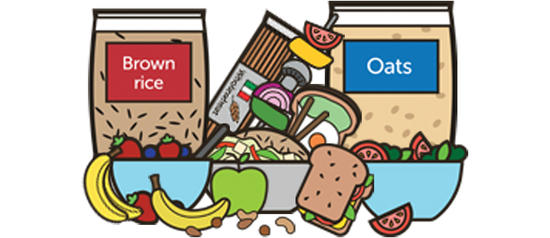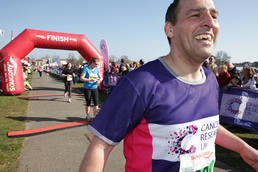Training for an event: Nutrition guide

Our nutritional information has been provided to us by our professional running partners Runningwithus. If you can’t find the information you need, or have any other questions regarding diet and nutrition, you can contact the coaches directly at info@runningwithus.com.
Training for a challenge like a marathon uses a lot of energy, so your diet may need to be adjusted to account for the extra exercise your doing. For general advice on healthy balanced diets, visit our health webpages.
Everyday nutrition
The three cornerstones to being a better runner are training, rest and nutrition. Your fitness will build if you get these elements balanced and consistent. Our simple strapline is: Never hungry, never full.
- A quality breakfast, lunch and evening meal are crucial
- Try to graze throughout the day – snacks play a vital role in avoiding feeling hungry
- Quality snacks include rice cakes, oat cakes, malt loaf, nuts, seeds and fruit
- Always eat well on your rest days - your body needs food to recover from training, so don’t compromise recovery by eating less when resting
- Try to vary foods and timings of meals and snacks before you run to find out what works for you
Nutrition during training and racing
Energy gels can make a huge difference to your performance and energy during long runs. Follow these tips to keep fuelled while you work hard:
For runs between 60-90 minutes
• Eat a meal 2-3 hours before your run
• Only run before breakfast if it’s an easy run and no longer than 45-60 minutes
For runs over 90 minutes
• Take gels, shot blocks or other forms of easy to digest carbohydrate
• Take the first energy gel 30-45 minutes into a long run - repeat every 30-45 minutes
• Sip the gel and don’t gulp it down
• Get into a routine on your training runs and don’t change it on race day
• Sip water occasionally on long runs and use a sports drink to stay hydrated
Our top tip is to find what works for you, stick to it and make sure you always feel comfortable
Nutrition after running
Nutrition immediately after training has been proven to boost recovery rates and make the athlete stronger. The tips below will keep you healthy after training hard:
• Taking on sustenance is crucial in the minutes after a run.
• If you’re not planning to finish your long run at home, make sure you take an energy drink/recovery shake with you.
• Make sure the recovery sports drink or shake has good amounts of both carbohydrate and protein. Ideally this type of running recovery drink will include 2:1 or 4:1 carbohydrate:protein content.
• Aim to eat a healthy balanced meal 60-90 post run.
Hydration for every day, training & racing
Every athlete knows hydration is important. Follow these tips to keep hydrated:
• Water is your best friend, sip it throughout the day
• Have a large bottle of water on your desk or in your bag
• Use the colour of your urine as a very rough guide to basic hydration levels (the paler the urine the more hydrated you are)
• Use hydration tablets when training hard or in the warmer summer months - drop the hydration tablet into a large bottle of water and sip during the day or in the hours before you run
• Sip sports drinks or water to stay hydrated during longer runs - practice only taking little mouthfuls
Training for an event?
Whether it's your first 10k or you're a seasoned marathoner, we have a training plan for you.

